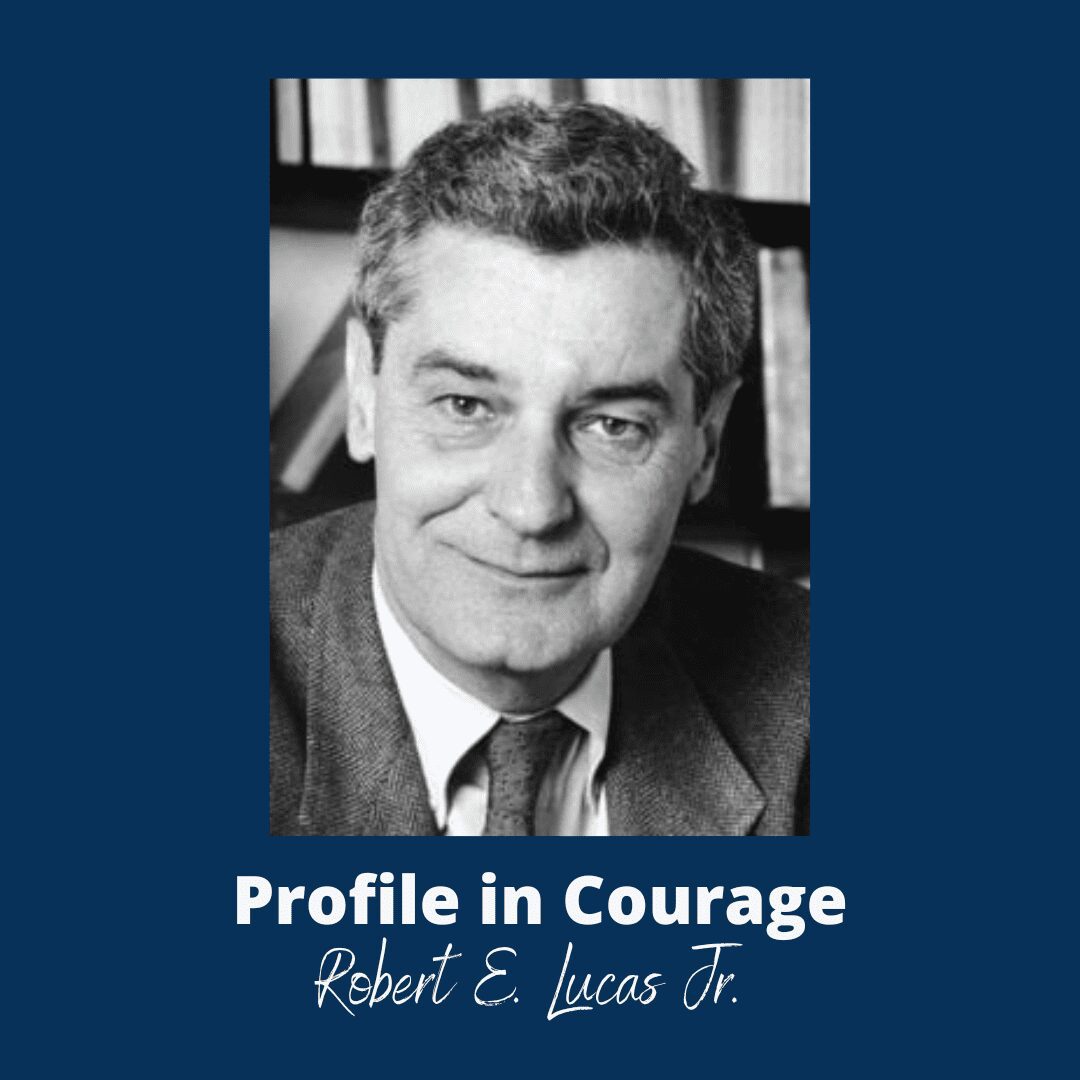
Profile in Courage: Robert E. Lucas Jr.
Taxpayers Protection Alliance
May 26, 2023
It’s difficult to challenge academic orthodoxy. Going against prevailing ideas can lead to plenty of ridicule and seriously damage career prospects. Yet, Dr. Robert (“Bob”) Lucas bravely went against the Keynesian orthodoxy in economics, arguing convincingly that economists need to take people’s actual beliefs and actions into account before evaluating the impact of government policies. Dr. Lucas slammed shut the old, dusty textbooks advocating for open-ended stimulus spending, and authored his own works arguing for restraint and humility in policymaking. The famed economist recently passed, but his ideas endure on in classrooms and even some state governments. For leading an academic revolution and championing fiscal responsibility, Bob Lucas is a Profile in Courage.
Dr. Lucas was a child of the Great Depression, and his family’s early struggles helped form his later beliefs. His parents had moved his family 150 miles from Seattle to Yakima, Washington to open an ice cream shop, but the business failed during the recession of 1937-38. Washington, D.C. may have been on the other side of the country, but the Roosevelt administration’s hostile attitude toward business had significant ripple effects and cost the Lucas family dearly. Interestingly, though, the future economist’s parents were Democrats while the rest of his extended family were sharply critical of President Roosevelt and the New Deal. These heartfelt disagreements, as well as Dr. Lucas’ later turn against Democratic orthodoxy, demonstrated that it was okay to “go against the grain” and question dominant societal beliefs. While his immediate and extended family held differing political and economic views, their shared belief that, “one could decide for oneself what kind of person to be, and that one ought to think about these decisions” left a lasting influence on Dr. Lucas.
He decided to pursue mathematics in school and quickly realized that subjects such as calculus had real applications in the wider world. Dr. Lucas recalled that, when he took calculus in high school, his dad, “enlisted my help on a refrigeration design problem he was working on – and actually used my calculations! It was my first taste of real applied mathematics, and an exciting one.”
The curious student eagerly delved deeper into mathematics and discovered the technical field of economics as taught by larger-than-life professors such as Milton Friedman and Paul Samuelson. As Lucas earned his doctorate at the University of Chicago and kicked off his teaching career at Carnegie Mellon, he busily began researching previous boom-and-bust cycles and modeling business investment decisions. His work produced a profound realization that flew in the face of conventional economic wisdom. The economic models printed in textbooks at the time assumed that individuals and businesses reflexively responded to government stimulus policies by spending and investing money. These results would supposedly play out the same way even after multiple rounds of stimulus.
Dr. Lucas realized that this wasn’t true, and individuals made decisions based on their “rational expectations” of what would happen in the wider economy. If individuals believed that increased government debt (resulting from stimulus spending) would weigh down the economy, they might save any government checks they receive instead of going on a spending spree. Similarly, slashing interest rates repeatedly over time could lead to workers expecting increased wages and businesses increasing prices to pay for this compensation. The result would be far from the simple, traditional model of rate cuts lighting a fire underneath the economy and facilitating growth.
Dr. Lucas’ landmark 1976 paper “Econometric Policy Evaluation: A Critique” ushered these ideas out into the academic world, but not without plenty of criticism. Old-school Keynesian economists such as Robert Solow, Lawrence R. Klein, and James Tobin slammed the rational expectations framework as irrelevant for making sense of the modern world and doubled down on their rigid theories. Meanwhile, local and federal deficits continued to balloon through the 1970s.
Eventually, though, Keynesian economists acknowledged the need to respond to Dr. Lucas’ critiques and began incorporating rational expectations into their models. Lawmakers and public officials started paying more attention to limited government principles, leading to deficit reduction agreements and better cost-benefit analyses. In 1995, Dr. Lucas won a Nobel prize for his groundbreaking work and delivered “one of the most readable Nobel economics lectures” to come out in an increasingly-technical generation of academics.
At a time when the national debt has surpassed $30 trillion, it’s difficult to claim that Dr. Lucas’ ideas have truly caught on. But, he at least started a critical conversation that forced big government advocates to justify their increasingly tortured logic. Dr. Lucas is a Profile in Courage for making the case against reckless policies and asking all the right questions along the way.
